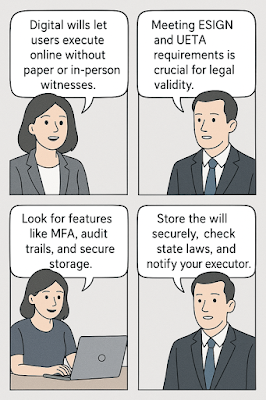Digital Wills Execution Platforms Compliant with E-Signature Laws
Digital Wills Execution Platforms Compliant with E-Signature Laws
Creating a legally binding will used to require in-person witnesses, notaries, and heaps of paperwork.
But with the rise of digital estate planning, many people are now turning to platforms that allow electronic execution of wills.
This shift brings both convenience and legal complexity—especially around e-signature compliance.
In this post, we’ll explore how digital wills are executed online, what legal standards apply, and which platforms meet those requirements.
📌 Table of Contents
- Why Digital Wills Are on the Rise
- Legal Framework: ESIGN, UETA & State Laws
- Key Platform Features for Legal Compliance
- Top Tools for Digital Will Execution
- Final Tips for Using Digital Will Platforms
- Helpful External Resources
📈 Why Digital Wills Are on the Rise
The pandemic accelerated remote legal services, and estate planning was no exception.
Digital wills enable users to create, sign, and store their final wishes securely from anywhere.
Millennials and tech-savvy Gen Xers are increasingly favoring these platforms for their speed and simplicity.
⚖️ Legal Framework: ESIGN, UETA & State Laws
Two major laws govern e-signatures in the U.S.:
1. ESIGN Act (2000): Grants electronic signatures the same legal standing as wet signatures in most commercial and legal transactions.
2. UETA (Uniform Electronic Transactions Act): Adopted by 49 states (except New York), it further defines conditions under which e-signatures are valid.
However, state-level probate codes vary widely, and not all jurisdictions accept electronically signed wills without additional procedures.
🔒 Key Platform Features for Legal Compliance
To ensure compliance, digital will platforms should offer:
✔ Multi-factor authentication
✔ Time-stamped audit trails
✔ Secure cloud storage
✔ Witness and notary integration (via video or embedded workflow)
✔ Jurisdiction-specific customization
🛠 Top Tools for Digital Will Execution
Here are some widely used platforms designed for compliance:
Trust & Will: A popular U.S. platform that meets e-signature and remote notarization standards in most states.
Fabric by Gerber Life: Offers basic digital wills with clear workflows and email-based verification.
LegalZoom: Includes online will creation with optional attorney consultation for document review.
📋 Final Tips for Using Digital Will Platforms
✅ Check if your state allows e-signed wills or remote notarization.
✅ Store your digital will in at least two secure places.
✅ Notify executors and beneficiaries of access procedures.
✅ Use platforms with active legal updates and version control.
🔗 Helpful External Resources
Important Keywords: digital will platforms, e-signature law, online estate planning, ESIGN UETA compliance, legal tech tools
